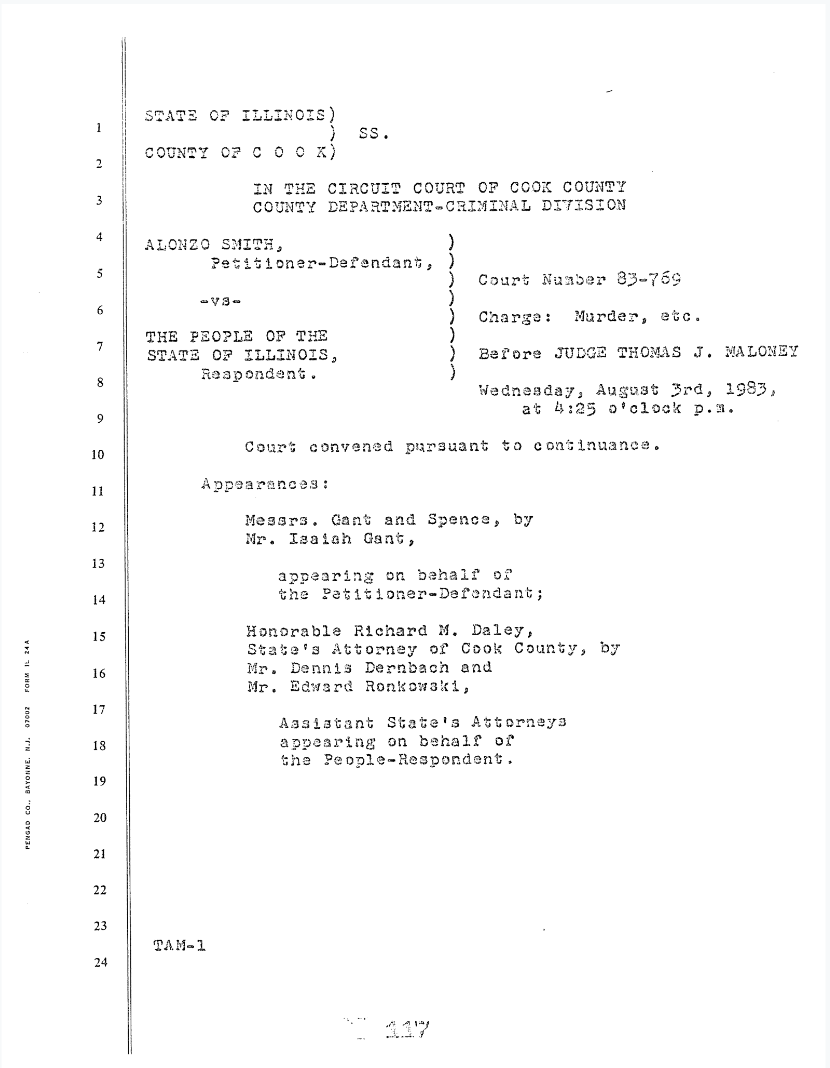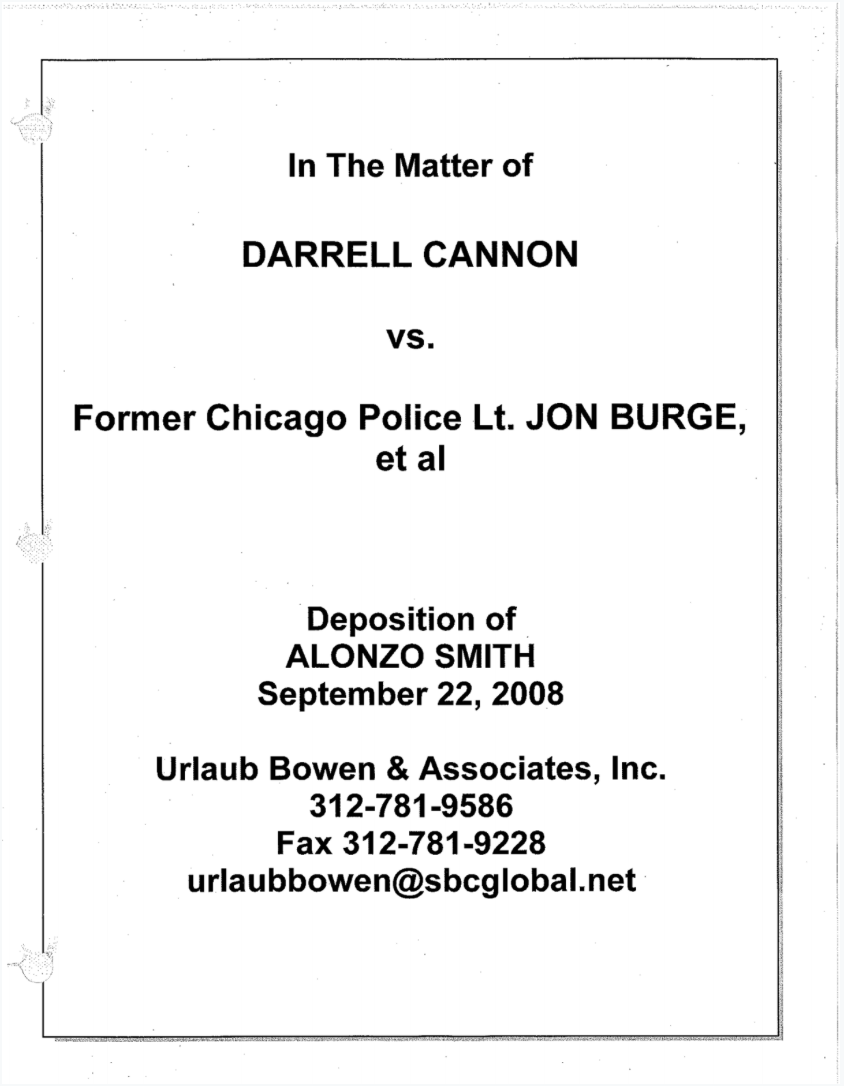The following profile has been republished with permission from The National Registry of Exonerations.
On January 18, 1983, the body of 34-year-old James Fullilove, a drug dealer, was discovered in his apartment on the South Side of Chicago. He was found asphyxiated with his head submerged in the bathtub full of water.
Two days later, Fullilove’s girlfriend, Glenda Cobb, called police and said she was present in the apartment when Allen Davis, a Chicago police officer who lived across the hall, came in and demanded Fullilove’s drugs and money. In a later conversation with police, Cobb said Davis was accompanied by a man named “Smitty,” who helped kill Fullilove in the bathroom by standing on his neck until he died.
Cobb’s sister told police that “Smitty” was 35-year-old Alonzo Smith—although she admitted later that she knew another man who also went by the nickname “Smitty.”
Smith arrives at police station
Smith was a Vietnam veteran and a bus driver for the Chicago Transit Authority. He had a wife and four children, and no prior arrests. Cobb said she had seen Smith at a party some time prior to the murder, though she had not met him.
Smith came to a detective station on January 21 after learning that the police came to his home looking for him. He was put in a lineup and Cobb identified him. He was taken for a polygraph examination during which he denied any involvement in the murder and denied knowing Davis. Meanwhile, Davis also was brought in for questioning. Like Smith, Davis denied involvement in the crime and denied knowing Smith.
Later that evening, detectives John Byrne and Peter Dignan took Smith to the basement of the detective station. Smith later testified that Dignan said, “We are going to have a real conversation now.”
Smith said he was seated in a metal chair with his hands cuffed behind his back, and the detectives began interrogating him. When he refused to admit involvement in the murder, Dignan struck him repeatedly with a black nightstick, sometimes between his legs, and Byrne kicked him in the abdomen. When Smith still refused to admit involvement, they placed a black plastic bag over his head and secured it with a thick rubber band. One of them said they were going to show him “how to suffocate a drug dealer.”
Smith tortured, confesses
Smith said he was beaten and kicked with the bag on his head. The next thing he recalled was the bag removed from his head, and the detectives pulling him back into the chair, telling him that was “round one.” They asked him again about committing the murder with Davis and when Smith again denied any knowledge, he was again bagged, beaten, and kicked.
Smith later testified that when it appeared he was going to be bagged a third time, he capitulated and asked what they wanted him to say. Smith said the detectives told him a scenario and then cleaned the blood off his face and clothing with a water hose.
Smith was taken to a room where he gave a court-reported confession. He was then charged with first-degree murder, armed robbery, home invasion, and armed violence.
Smith’s attorney filed a motion to suppress the confession. Medical personnel and family members testified that Smith’s face was swollen and that he had bruises on his body. Cook County Circuit Court Judge Thomas Maloney (who years later was imprisoned for taking bribes to fix murder cases) denied the motion after the detectives denied mistreating Smith and the prosecution presented a photograph of Smith that the judge said showed no injuries to Smith’s face.
Davis and Smith went to trial together in June 1984, but with separate juries. Glenda Cobb recounted how the two men robbed and murdered Fullilove. She said that Davis wanted to kill her, but that Smith said that he would make sure Cobb didn’t talk. Cobb testified that after the murder, she went to her sister’s home, then went to a liquor store to buy beer and said nothing to her sister.
Cobb testified that she went to her regular shift as a hospital nurse the following day and it was not until she claimed Davis called her and threatened to kill her that she called police.
Witness testimony falls apart
On cross-examination, Cobb admitted when she first talked to police, she only implicated Davis. She also said that she had been relocated at the taxpayer’s expense to Florida. She admitted that she had concealed past convictions for theft when she applied for her nursing job, that she had lied about her credentials, and that she was addicted to painkillers while working as a nurse.
No physical evidence linked either Davis or Smith to the crime.
Dignan and Byrne testified that Smith confessed that he and Davis had committed the murder. Both men denied mistreating Smith.
Smith testified and denied any involvement in the crime. He again gave a graphic description of being beaten and nearly suffocated by Dignan and Byrne.
On July 2, 1984, the two juries convicted Davis and Smith of first-degree murder, armed robbery, and home invasion. Each man was sentenced to 40 years in prison.
No relief for Smith in courts
Smith’s convictions were upheld on appeal. In 1996, he filed a post-conviction petition for a new trial, citing a growing body of evidence that Dignan and Byrne were among numerous detectives under the command of Lt. Jon Burge who systematically tortured suspects to confess to murders and other crimes. This evidence included testimony from other defendants in unrelated cases that they were tortured in a similar fashion, as well by having shotguns shoved into their mouths and wires that delivered electric shocks from a hand-cranked generator clipped to their bodies, including their genitals.
In 1990, a report by the Chicago Police Office of Professional Standards, called the Goldston Report, detailed the systematic use of torture by Burge and detectives under his command in more than 50 cases. In 1993, the Chicago Police Department fired Burge because of the torture claims.
The petition also presented new evidence relating to Glenda Cobb, who claimed she had quit her nursing job the day after the murder. In fact, she had been fired for stealing drugs and injecting patients with saline to cover up the thefts.
Smith’s petition, however, was denied without a hearing, and the denial was later upheld by the Illinois Appeals Court and the Illinois Supreme Court. Smith was released on parole in October 2002 after nearly 20 years in prison during which time he earned three college degrees. Davis was released on parole in 2005.
‘Staggering’ evidence of torture
In 2013, Smith filed another post-conviction petition. By that time, more than 100 defendants had alleged that Burge and the detectives under his command had tortured them. In 2010, Burge was convicted in federal court of perjury for denying torture allegations during questioning in federal lawsuits brought by other torture victims. He was sentenced to 4½ years in prison.
In May 2015, the Chicago City Council approved the establishment of a $5.5 million fund to pay reparations to torture victims. In September 2015, Cook County Circuit Court Judge Erica Reddick vacated Smith’s convictions and ordered a new trial. The judge said the evidence of torture was “staggering.”
On October 19, 2015, the Cook County State’s Attorney’s Office dismissed the charges. In 2016, Smith filed a federal civil rights lawsuit against the city of Chicago and Cook County. He settled with Cook County for $300,000. In March 2019, the city of Chicago agreed to settle for $5.25 million. Separately, he was granted a certificate of innocence and August 2019, he was awarded $230,800 in state compensation.
– Written by Maurice Possley




